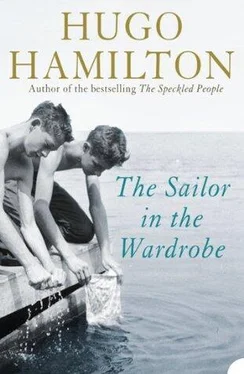The Gardai had found no trace of Stefan and decided to make a public announcement. He was officially registered as missing and a message was broadcast after the news one day. We all sat around the breakfast room listening to the news in English until the message came at the very end, just before the weather.
‘Here is a Garda announcement for Stefan Haas, a German national believed to be travelling in the West of Ireland. He is urgently asked to contact his family or any Garda station.’
It was great to hear that message being broadcast. I wished that I was Stefan myself. It was great to think of him hiding out there in the West of Ireland. I could imagine him hearing his own name being called out on the radio one day while he was sitting down to his dinner, maybe while passing by a public house with a radio on inside. I wanted to go missing like that and never come back. I could imagine him slipping away out of some town and the people looking after him, wondering if he was the German national they were all looking for. I could see him walking across the Burren, across the bogs of Connemara, trying to keep out of sight and moving further and further away from places where he might be spotted.
The Garda message was broadcast again a week later, but slightly altered this time.
‘Here is a Garda announcement for a German national named Stefan Haas who is believed to be missing in the West of Ireland. He is of tall, slim build and was last seen wearing a grey jacket and blue jeans. Anyone who has seen him is asked to contact the nearest Garda station.’
Every time we listened to the announcement, I thought the description didn’t fit him at all. It was not the way I remembered him. They should have said he looks like Beckenbauer, then everybody would have spotted him immediately. They should have asked if anyone had seen Beckenbauer hanging around the West somewhere, maybe checking into some bed and breakfast under an assumed name, pretending that he had no interest in soccer at all, only hill walking. They should have asked people to keep a look out for anyone kicking pebbles or maybe kicking an empty packet of cigarettes along the street. Maybe somebody saw him walking through the fields decapitating a thistle or a ragweed with the tip of his shoe.
Things were starting to escalate at the harbour, another word we picked up from Northern Ireland. One morning we came down to find that one of Dan Turley’s boats had gone missing. He had already been out searching around the bay, but it was Packer and me who eventually found it out past the island and towed it back. It was badly damaged, lashed by the tide against the rocks, and had to be taken out of the water. The crane on the pier was brought into action and when the boat was finally turned over and placed on trellises for inspection, Packer said it looked like it had been mauled by a wild animal. There were scratch marks all over the bow and along the bottom. Here and there, the paintwork had been gouged and you could see the wet, sinewy wood, soft and yellow, like torn muscle underneath.
Dan Turley said it would take a lot of repairing before it could go back into the water. He was full of anger, as if this was all part of the plot to kill him off at the harbour. You could see the vulnerability in his eyes as he stared at the savage bite marks and ran his hand over the damaged areas as if the boat had endured great pain, as if it was one of his children. He patted the bow and said it would be alright once we repainted it with red lead, anti-fungus paint. Then he turned away with a hurt look in his face, wishing he could get the animal who did this, wishing he could break his bones like twigs with his big steel hands.
And then a few days later a second boat went missing. Dan was ready to kill somebody. Even though the harbour lads found the boat undamaged on the beach, Dan said he was being deliberately targeted. The people who were doing this were insiders who knew how to get to the moorings. They had to get to the lead boat first, which was tied from one pier to the other with long ropes, slack enough to allow the tide to go out. The ropes were often hidden underwater. Only a person with some knowledge of the harbour would have known how to get out to the other boats. The Gardai came to investigate and promised to keep an eye on the place, but Dan was not happy with that, and for two or three nights, he stayed hidden in his shed, sleeping on his bunk and listening to every sound outside. But there was no point in him being a watchman, he would have to stay there awake every night of the week, twenty-four hours a day.
The harbour lads were repeating Dan’s words, saying they were going to crucify the man responsible. Nail him to the mast. Tie him to a lobster pot and sink the bastard. Already Dan had a fair idea who it was and stared around the harbour with great resentment, as if he would get his revenge some day soon. As he started fixing the damaged boat, his cursing increased.
Packer decided we were going to go on a trip to the West of Ireland. He told Dan we would be away for a week or two and Dan took this as a further conspiracy that we would suddenly abandon him in the middle of his crisis.
‘Fecking off to the Aran Islands,’ he growled.
I thought he might never want us to work for him again, but Packer was able to get around him, repeating the way that Dan said ‘feckin’ and ‘running off’ and ‘Off on your travels, like a pack a’ hooken gypsies.’ At last the harbour boys started laughing again, and making light of the whole matter of the stolen boats as if it was just a freak event.
My father had nothing against me going to the Aran Islands. He was glad that I was going to a place where they still spoke Irish, but he didn’t know that Packer was involved. I had my own money and maybe my father thought it was good that he could have the house to himself for a while, because I was like an enemy within.
Packer said it was going to be the first trip of many. We would travel all over Europe together, all around the world. He got a small gang of his best friends together from school and around the place where he lives, like an expedition to the Antarctic, with Packer as the leader and us as his crew, one with long hair and torn tennis shoes, another with glasses, carrying a coat with him every day, even when the sun was out. Another member of the expedition bounced along the street as he walked. Packer gave a running commentary on the trip, how we were going to discover the Aran Islands, how much beer we would drink, how many women we would meet, and how we were all characters in a big movie, Packer’s expedition to the edge of the Western World.
The first thing we noticed going out to Aran was the light. It was coming from the opposite direction and felt strange. To us living in Dublin, on the east coast of Ireland, the world seemed to be turned around a full hundred and eighty degrees when we took the boat from Galway out to the islands. The white glimmer of sunlight that we expected to see when coming ashore was right there ahead of us on the way out to sea. It was like an inverted homecoming, something, Packer said, that was similar to getting on the plane in the autumn and landing somewhere on the far side of the world in spring. On the Naomh Éanna ferry out to Inishmore, it felt as though we were going backwards in time, travelling into the mirror. We were staring into the light over the Atlantic. We could barely see the shape of the three islands in the distance. We could smell the sea and the diesel fumes and feel the throb of the engines in everything we touched. We could hear the murmur of Irish being spoken around us on the boat and became aware, without saying it openly, that we were no longer facing east, towards London or Europe, but west, into an older, untouched world.
Читать дальше
Конец ознакомительного отрывка
Купить книгу












